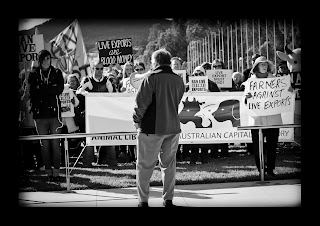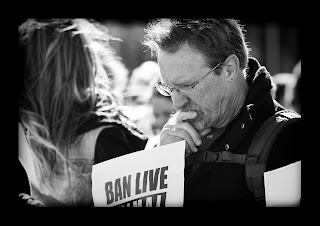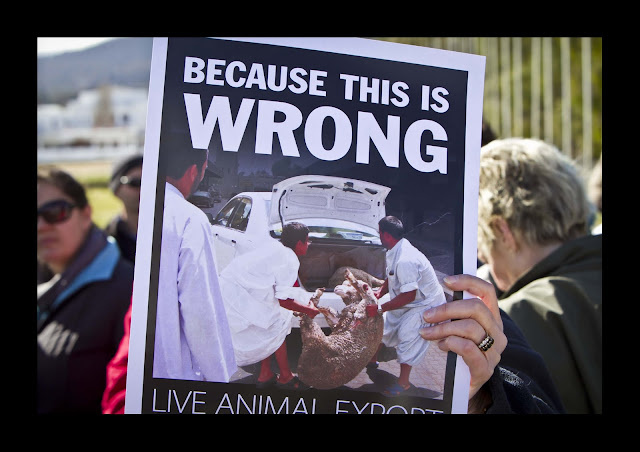Very excited to have the gorgeous images (and story) from Rebekah and Jacobs wedding featured on the fabulous Polkadot bride blog ! Check it out!
Wednesday, June 29, 2011
Featured on Polkadot Bride blog!
Sunday, June 19, 2011
Canberras Ban Live Export Rally
I attended the Canberra Ban Live Export rally yesterday at Parliament House. A small but passionate group had gathered and shared information and our common experience of feeling complete horror at the live export trade.
The people at the Canberra rally where a really interesting mix of people. Farmers (some MLA members), public servants, and animal liberation representatives. A lot of people mentioned to me that this was their first rally that they'd ever attended. It was mine also.
Rallies are not something I normally photograph, but I'm really behind this cause, so I wanted to go along and document the day.
Info from RSPCA & Animals Australia site.
The people at the Canberra rally where a really interesting mix of people. Farmers (some MLA members), public servants, and animal liberation representatives. A lot of people mentioned to me that this was their first rally that they'd ever attended. It was mine also.
Rallies are not something I normally photograph, but I'm really behind this cause, so I wanted to go along and document the day.
Info from RSPCA & Animals Australia site.
What about Australian farmers?
Numerous economic reports have confirmed that live exports are undermining Australia’s meat processing industry - an industry five times more lucrative than live exports. ACIL Tasman’s reviews into the live sheep trade found that phasing out live sheep exports would
have minimal impact on farmers and would in fact reap greater benefits for farmers and the economy
through increased processing in Australia. Reports into the impact of live cattle exports on Queensland’s beef industry have found that live exports are directly competing with the beef processing sector to the point of threatening its future viability.
Numerous economic reports have confirmed that live exports are undermining Australia’s meat processing industry - an industry five times more lucrative than live exports. ACIL Tasman’s reviews into the live sheep trade found that phasing out live sheep exports would
have minimal impact on farmers and would in fact reap greater benefits for farmers and the economy
through increased processing in Australia. Reports into the impact of live cattle exports on Queensland’s beef industry have found that live exports are directly competing with the beef processing sector to the point of threatening its future viability.
Why didn’t investigators take this footage directly to the government?
Footage of further cruel treatment of Australian exported sheep in the Middle East was taken directly to Senator Ludwig in November 2010. He failed to take appropriate action and instead put finding a
solution back in the hands of live exporters. Requests for meetings with the Minister since February thisyear have also been declined. In April, the Minister was advised about the severity of cruelty witnessed during the investigation in Indonesia but he has not requested to see the footage or discuss what was observed. The RSPCA’s and Animals Australia’s experience is that only when the public are made aware of the cruel treatment of Australian exported animals via the media, does the government take notice. The suspension of the Egypt trade in 2006 only occurred after footage was aired on 60 Minutes, despite Agriculture Minister Peter McGauran already being informed that cattle were being brutalised in Bassateen abattoir.
Footage of further cruel treatment of Australian exported sheep in the Middle East was taken directly to Senator Ludwig in November 2010. He failed to take appropriate action and instead put finding a
solution back in the hands of live exporters. Requests for meetings with the Minister since February thisyear have also been declined. In April, the Minister was advised about the severity of cruelty witnessed during the investigation in Indonesia but he has not requested to see the footage or discuss what was observed. The RSPCA’s and Animals Australia’s experience is that only when the public are made aware of the cruel treatment of Australian exported animals via the media, does the government take notice. The suspension of the Egypt trade in 2006 only occurred after footage was aired on 60 Minutes, despite Agriculture Minister Peter McGauran already being informed that cattle were being brutalised in Bassateen abattoir.
But the industry claims that Australia’s presence in Indonesia (and other importing countries)
gives us greater influence to improve animal welfare generally
This statement is completely unfounded and is part of a cunning industry PR campaign to keep farmer and government support. Australian industry presence in Indonesia has in fact made animal welfare worse as Australian funded and installed equipment has set a standard of cruelty that the Indonesians are now copying. Animal welfare in Indonesia (and other importing countries) will only improve when animal welfare legislation is passed or when current animal welfare legislation is amended to include penalty provisions and is enforced. The only significant welfare improvement in the Middle East, despite the live export industry exporting there for 30 years, is the introduction of stunning in Jordan which resulted from an Animals Australia investigation and direct involvement of the Jordanian royal family.
gives us greater influence to improve animal welfare generally
This statement is completely unfounded and is part of a cunning industry PR campaign to keep farmer and government support. Australian industry presence in Indonesia has in fact made animal welfare worse as Australian funded and installed equipment has set a standard of cruelty that the Indonesians are now copying. Animal welfare in Indonesia (and other importing countries) will only improve when animal welfare legislation is passed or when current animal welfare legislation is amended to include penalty provisions and is enforced. The only significant welfare improvement in the Middle East, despite the live export industry exporting there for 30 years, is the introduction of stunning in Jordan which resulted from an Animals Australia investigation and direct involvement of the Jordanian royal family.
No amount of profit or excuses can justify continued support of the cruelty inherent to the
live export trade
Were those involved in this trade made accountable to Australian animal welfare laws they would be
prosecuted and convicted for animal cruelty. This trade has continued only because it operates
outside of the reach of Australian animal protection legislation. Chilled and frozen meat exports from
Australia are already worth over five times the value of live exports annually and would further increase if Australia was not providing importing nations with the alternative of live animals.
live export trade
Were those involved in this trade made accountable to Australian animal welfare laws they would be
prosecuted and convicted for animal cruelty. This trade has continued only because it operates
outside of the reach of Australian animal protection legislation. Chilled and frozen meat exports from
Australia are already worth over five times the value of live exports annually and would further increase if Australia was not providing importing nations with the alternative of live animals.
Subscribe to:
Posts (Atom)
























































